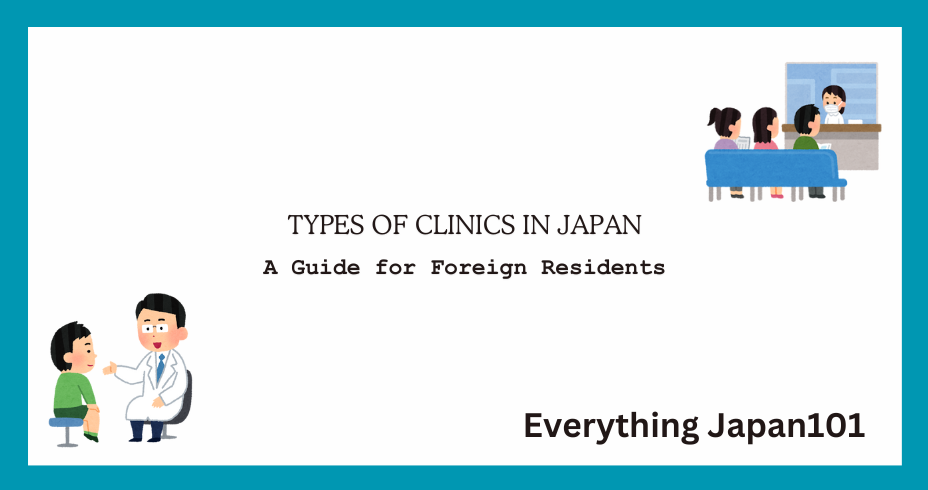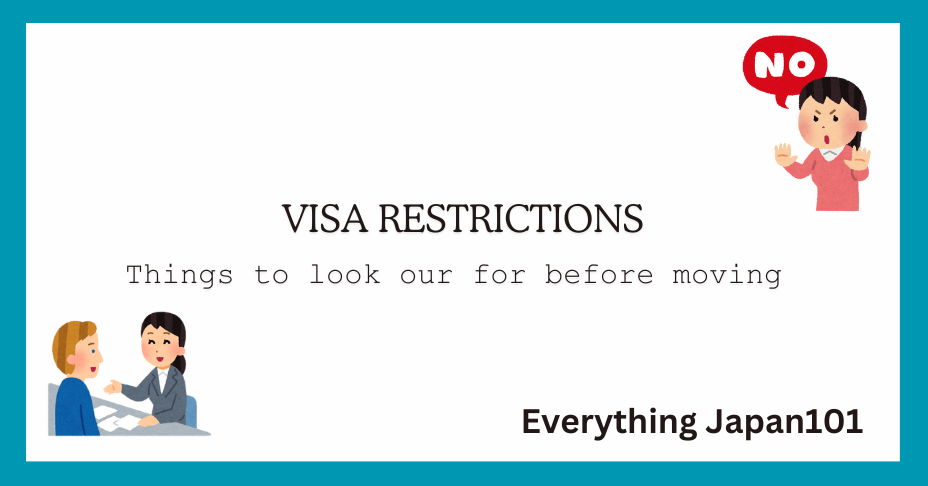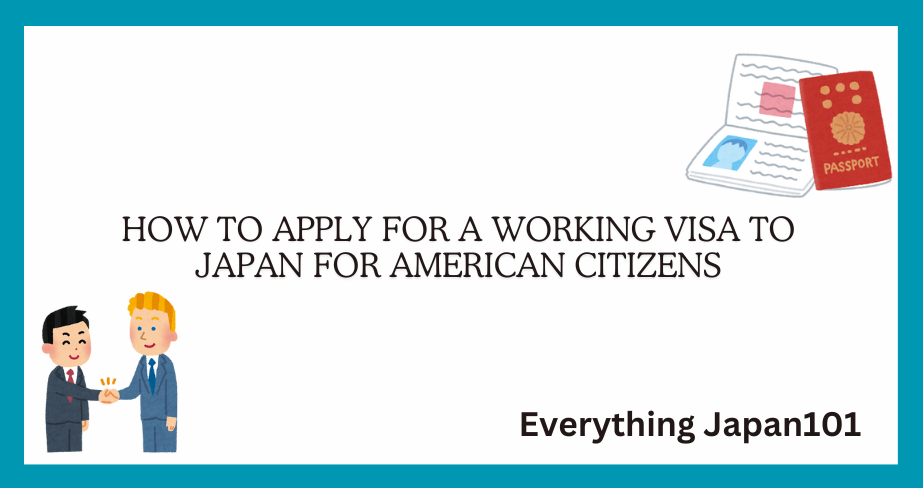Types of Clinics in Japan: A Guide for Foreign Residents

Moving to a new country comes with challenges, especially when it comes to healthcare. In Japan, clinics and hospitals have distinct areas of specialization, often indicated by unique Japanese terms. Knowing where to go for different health issues can make a big difference in getting the right care quickly. Here’s a guide to the various types of clinics and practices in Japan to help you navigate the healthcare system with ease.
- Naika (内科) – Internal Medicine Clinics
- Seikei Geka (整形外科) – Orthopedic Clinics
- Geka (外科) – Surgery Clinics
- Jibiinkouka (耳鼻咽喉科) – ENT Clinics
- Ganka (眼科) – Ophthalmology (Eye Clinics)
- Shika (歯科) – Dental Clinics
- Hifuka (皮膚科) – Dermatology Clinics
- Sankafujinka (産科婦人科) – Obstetrics and Gynecology (OB-GYN)
- How to Choose the Right Clinic
- Quick Reference Table: Types of Clinics in Japan
- Conclusion
Naika (内科) – Internal Medicine Clinics
What It Means:
Naika clinics specialize in internal medicine, similar to general practitioners in other countries. This is the place to go for common health issues like colds, fevers, stomach issues, and routine check-ups.
When to Visit Naika:
- Mild symptoms (fever, colds, flu)
- Digestive issues, like stomachaches or indigestion
- General fatigue or suspected infections
- Routine health check-ups
What to Expect:
Doctors at Naika clinics can usually prescribe medicine and run tests, such as blood work, on-site. For more specialized treatment, they may refer you to another type of specialist.
Seikei Geka (整形外科) – Orthopedic Clinics
What It Means:
Seikei Geka focuses on orthopedics, covering issues related to bones, muscles, and joints. It’s ideal for injuries, pain, or discomfort in the body’s structural system.
When to Visit Seikei Geka:
- Back pain, neck pain, joint issues
- Muscle strains, sprains, or fractures
- Sports-related injuries
What to Expect:
Orthopedic clinics often have on-site X-ray machines and physiotherapy options to aid in diagnosis and treatment.
Geka (外科) – Surgery Clinics
What It Means:
Geka clinics are surgical clinics that handle more complex cases requiring minor to moderate surgery or ongoing care for surgical wounds.
When to Visit Geka:
- Minor surgical procedures
- Treatment of cuts, burns, and wounds
- Post-surgery follow-up care
What to Expect:
Geka clinics can handle non-emergency surgical needs and perform minor operations. More severe surgical cases are usually referred to hospitals.
Jibiinkouka (耳鼻咽喉科) – ENT Clinics
What It Means:
Jibiinkouka clinics focus on Ear, Nose, and Throat (ENT) issues. These specialists are ideal if you’re experiencing problems with your hearing, sinuses, throat, or neck.
When to Visit Jibiinkouka:
- Persistent sore throat or sinus infections
- Hearing problems or ear pain
- Allergies affecting the nose or throat
What to Expect:
ENT doctors use specialized equipment to assess and treat your issues. Some ENT clinics also provide allergy tests.
Ganka (眼科) – Ophthalmology (Eye Clinics)
What It Means:
Ganka clinics handle all eye-related issues, including routine eye exams and treatments for eye diseases.
When to Visit Ganka:
- Vision problems, such as blurred vision
- Eye infections or injuries
- Routine eye exams and prescriptions for glasses or contacts
What to Expect:
Ganka clinics often have specialized equipment for eye exams, visual tests, and treatment of common eye problems.
Shika (歯科) – Dental Clinics
What It Means:
Shika clinics focus on dental care, including routine cleanings, fillings, and more complex dental treatments.
When to Visit Shika:
- Routine dental cleaning or check-up
- Cavities, toothaches, or gum problems
- Orthodontic treatments (such as braces)
What to Expect:
Japanese dental clinics provide comprehensive dental services, and appointments may require booking in advance.
Hifuka (皮膚科) – Dermatology Clinics
What It Means:
Hifuka specializes in dermatology, handling skin, hair, and nail concerns.
When to Visit Hifuka:
- Skin issues like acne, rashes, or eczema
- Hair loss or scalp problems
- Skin infections or minor burns
What to Expect:
Hifuka clinics often use specialized tools to diagnose and treat various skin conditions and may also offer cosmetic dermatology services.
Sankafujinka (産科婦人科) – Obstetrics and Gynecology (OB-GYN)
What It Means:
Sankafujinka clinics focus on women’s reproductive health, including prenatal and postnatal care, and routine gynecological health.
When to Visit Sankafujinka:
- Routine gynecological exams and screenings
- Pregnancy check-ups and prenatal care
- Concerns about menstrual health, contraception, or fertility
What to Expect:
OB-GYN clinics provide comprehensive care for women’s health, and many offer maternity classes as well.
How to Choose the Right Clinic
Choosing the right clinic in Japan can depend on a few factors:
- Check Clinic Hours: Many clinics close on weekends or have irregular hours.
- Call Ahead: Some clinics require appointments, while others accept walk-ins.
- Insurance and Cost: Be sure to carry your health insurance card and expect a small co-pay, as most services are partially covered by health insurance.
Quick Reference Table: Types of Clinics in Japan
| Clinic Type | Japanese Term | Specialty | Common Reasons to Visit |
|---|---|---|---|
| Internal Medicine | 内科 (Naika) | General health and internal issues | Colds, fevers, digestive issues, fatigue, infections |
| Orthopedics | 整形外科 (Seikei Geka) | Bones, muscles, and joints | Back pain, joint issues, muscle strains, sports injuries |
| Surgery | 外科 (Geka) | Minor to moderate surgical needs | Minor surgeries, wound care, burn treatment |
| ENT | 耳鼻咽喉科 (Jibiinkouka) | Ear, nose, and throat | Sore throat, sinus infections, allergies affecting ears/nose/throat |
| Ophthalmology | 眼科 (Ganka) | Eye health and vision issues | Eye exams, vision problems, eye infections |
| Dentistry | 歯科 (Shika) | Dental and oral health | Routine cleanings, cavities, orthodontics |
| Dermatology | 皮膚科 (Hifuka) | Skin, hair, and nail issues | Acne, rashes, hair loss, minor burns |
| OB-GYN | 産科婦人科 (Sankafujinka) | Women’s reproductive health | Routine exams, pregnancy care, menstrual health, contraception advice |
Conclusion
Navigating healthcare in Japan can seem complex at first, but understanding the specialties of different Types of Clinics in Japan makes it easier to get the right care quickly. Whether it’s a routine check-up, an injury, or a specialist for more specific needs, Japan’s healthcare system has a wide range of facilities tailored to address various health issues. By familiarizing yourself with clinic types and Japanese terms, you can approach your healthcare confidently and make informed decisions. Remember, most clinics will accept Japanese health insurance, and it’s always a good idea to call ahead and check for appointment requirements. With this guide as a reference, you’ll be well-prepared to find the healthcare services you need while living in Japan.











